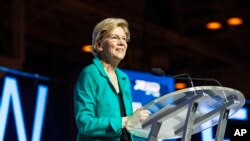Elizabeth Warren raised $19.1 million in the second quarter, her campaign said Monday, cementing her status in the top tier of Democratic presidential contenders and a leading voice of the party's liberal base.
The Massachusetts senator's second-quarter contributions leave her behind only Pete Buttigieg, the South Bend, Ind., mayor who reported nearly $25 million in donations, and former Vice President Joe Biden, who tallied $21.5 million since his candidacy began in late April.
Perhaps most notably, Warren's donations exceeded those reported by Vermont Sen. Bernie Sanders, her closest rival, who is also vying for liberal voters and is the only other candidate who has joined her in swearing off high-dollar fundraisers.
Warren's success underscores the threat she poses to both Sanders and California Sen. Kamala Harris, whose $12 million second-quarter fundraising got a major boost in the final days of last month from her performance in the first Democratic debate. While Sanders appeals to progressives seeking an ambitious Democratic agenda, Warren has staked a claim to his base with her now-trademark policy plans. And as Harris seeks a foothold with black voters as the primary's lone black female candidate, Warren is making headway of her own with black women.
“To sum it up: We raised more money than any other 100% grassroots-funded campaign,” said Roger Lau, Warren's campaign manager. “That's big.”
Warren more than tripled the $6 million she raised in the first three months of 2019 , when she silenced some skeptics of her long-term fundraising viability following her decision to rely on grassroots rather than high-dollar donations. The campaign's $19.1 million came from more than 384,000 contributors giving more than 683,000 donations.
That's less than the nearly 1 million individual donations Sanders' campaign reported, but comparable with the 725,000 online donations that President Donald Trump's reelection campaign reported during the second quarter.
Warren's extensive organizing apparatus, particularly in early voting primary states, remains both a formidable asset — and a significant cost — as the campaign prepares to report $19.7 million in cash on hand. Her operation currently counts more than 300 paid staff members, 60% of whom are in the four early voting states of Iowa, New Hampshire, South Carolina and Nevada, according to the campaign.
While a staffing footprint of that size is likely to spark questions about Warren's high spending rate among some of her presidential rivals, her team has already underlined its confidence that the campaign will have enough resources for the long term.
“Overall, the Warren operation has a six-figure number of people who own a piece of the campaign and an eight-figure amount of money to go execute the plan. So, game on,” Warren adviser Joe Rospars tweeted after her first-quarter fundraising tally emerged.
Warren has an energetic output of policy proposals on everything from education to climate change, a signature of her 2020 efforts that has helped her push past a rocky start in the primary. That fast pace isn't likely to change as the Democratic campaign nears an expected winnowing from about two dozen candidates.
This week alone, Warren is scheduled to hold a town hall in Milwaukee after joining a half-dozen other Democratic presidential hopefuls at a gathering hosted by the League of United Latin American Citizens. She'll then head to Philadelphia for Netroots Nation, an annual conference for progressive activists.
“In the weeks and months ahead, we'll keep growing our movement across the country and Elizabeth will keep rolling out new plans to level the playing field for working people,” Lau wrote in an email to supporters.
Warren was already a guaranteed presence in this fall's Democratic primary debates, which require at least 130,000 donors as well as minimum polling performance according to rules set by the Democratic National Committee. She'll likely be joined on that stage in the fall by a rival whose showing she praised after last month's first debate: former Housing Secretary Julian Castro, who reported on Monday that he had met the higher donor threshold needed to qualify.




